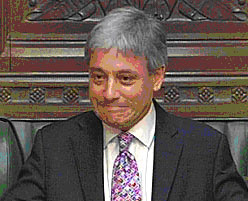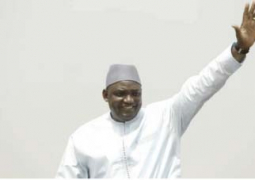
Following the so-called expense scandal that hit
The new Speaker John Bercow, a member of the opposition Conservative Party gained the majority support of the House. He is also the youngest to hold such a position since 1839, by winning his other rivals who also contested for the position in a secret ballot.
He is 46-years-old and has some friends in the ruling Labour ranks and also gained respect and credibility over the years. He is also a well-known figure maybe which is why he was able to defeat Sir George Young, his closet rival by 322 votes to 271. A total of eight candidates were duly eliminated.
Speaker Bercow's predecessor, Martin was the first Speaker to be ousted in more than 300 years after MPs blamed him for not ''reacting quickly enough'' to the expenses scandal which resulted in several resignations.
His alleged failure to react quickly on the issue is still a bone of contention as many commentators believe that the issue alone should not have been enough to force him out. His supporters believed an apology was enough, while his critics protested that he is ''soft and too nice to some Members of Parliament.
Therefore, in the interest of public confidence, Martins decided to quit office and gave room for a change.
Some of the MP s still maintain that the expenses they claimed were ''within the rules'' of the House of Common, but the explanation forwarded was not accepted by many voters, especially when the press kept releasing names of MPs involved, including the various amounts of money they allegedly claimed and what such items were meant for.
In his speech, the new Speaker revealed that he wants to ''implement an agenda for reform and for renewal, revitalisation and for the re-assertion of the core values of this great institution in the context of the 21st century''.
Many observers say it seems the new Speaker is fully aware of peoples' concerns, especially when certain commentators said many around the world are looking up to the UK House of Common and therefore its reputation must never be stain.
In his speech, the new Speaker said: ''Unless we can move the debate on from sleaze and second homes to the future of this House we shall remain in deep trouble. A legislature cannot be effective while suffering from public scorn. We can rebuild trust and restore our reputation, but only if we can make a clean break and demonstrate once again that it is an honour, without equal, to sit in this House''.
The new Speaker also stressed that his ''commitment to this House is to be completely impartial as between members of one political party and another. That is what it is about? I believe the vast majority of the Members of this House are upright, decent, honourable people who have come into politics not to feather their nests but because they have heeded the call of public service."
Such statement was seen by many experts as positive but others cautious, for example, Justin Fisher, Professor of Political Science said: ''Restoring public trust is not a five minute job. The trouble with any prospective reforms is that observers and commentators are impatient and good reform takes time to develop''.
It is vital to note that the new Speaker will not be in charge of MPs' pay and expenses as Prime Minister Gordon Brown had made it clear that an Independent Commission will take over the day-to-day administration of the House of Commons. Already that Commission has been authorised with the powers to start such an important job.
Meanwhile, the issue of the so-called expenses scandal appears to fade away, however, the Daily Telegraph, the Newspaper that broke the news in the public domain said that it's not the case and even threatened to make more revelation in the next few weeks.




